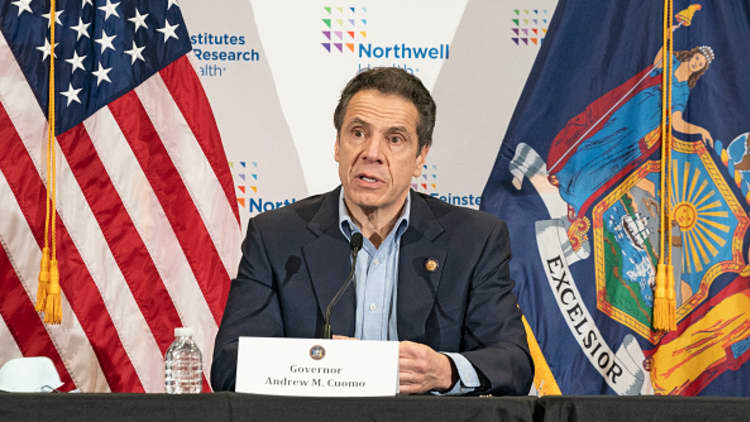
Coronavirus deaths in New York remain "horrifically high," even as some projections of the state's outbreak suggest it may be on the verge of a "descent," Gov. Andrew Cuomo said at a press conference in Albany on Monday.
Some 478 New Yorkers died from the virus on Sunday, a decline from the daily death toll at the disease's peak when nearly 800 residents a day were dying, Cuomo said. On Saturday, 507 people in the state died, and 540 deaths were recorded Friday.
There were 1,380 new Covid-19 hospitalizations in New York on Sunday, a slight tick down from 1,384 on Saturday, Cuomo said. The number of intubations has also gone down, he said.
Cuomo stressed the importance of testing, saying his government is "starting the largest antibody testing ever done today" to determine who has already been infected. On Sunday he announced that the Food and Drug Administration approved the state's antibody test and that the state would roll out antibody testing this week.
"Testing is going to require everyone to work together," Cuomo said, noting that the effort will require close cooperation between states and the federal government.
Serological, or antibody, tests can indicate whether a person has had Covid-19 in the past and was either asymptomatic or recovered. President Donald Trump's new guidelines for states and U.S. regions to "reopen" recommend that hospitals have an antibody testing system in place before governments begin relaxing their social distancing restrictions.
But the World Health Organization warned Friday there's no evidence antibody tests can show whether a person is immune.
"Right now, we have no evidence that the use of a serological test can show that an individual is immune or protected from reinfection," said Dr. Maria Van Kerkhove, head of WHO's emerging diseases and zoonosis unit.
More than 2.4 million people have tested positive for the coronavirus, and at least 165,939 have died, data from Johns Hopkins University show. In the U.S., more than 759,700 Covid-19 cases and at least 40,683 deaths have been confirmed, according to Johns Hopkins.
While the crisis isn't over, the infection rate has declined to a level that marks a slowdown, Cuomo said.
But Cuomo urged New Yorkers to continue following the state's strict social distancing policies, even as warmer weather tempts more people to venture outdoors.
"They will come out with warmer weather," Cuomo said. "That contact will increase the virus spread."
Beaches, public facilities and schools would be "magnets" for the virus if public activity increases too quickly, Cuomo said. "Everything is closed unless we say otherwise."
Cuomo said front-line workers, who have been overwhelmed by the surge in coronavirus patients and have higher rates of infection, deserve to be paid for their efforts.
"When you were home dealing with cabin fever, they were out there dealing with the coronavirus," Cuomo said.
"Pay them what they deserve," he said of the front-line workers. "I would say hazard pay, give them a 50% bonus, and I would do that now."
Women, people of color and people from low-income households, who make up large percentages of the state's front-line workforce, are disproportionately affected by the outbreak, Cuomo said.
"The economy did not close down. It closed down, essentially, for the people who had the luxury of staying at home," he said, adding that the infection rate among "brown Americans and African Americans" is higher than that of other groups.

